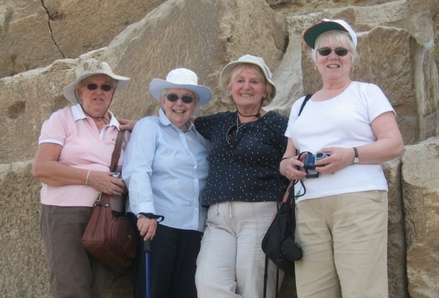This post is part of a series for older travellers. Read Tips for older travellers: Heart disease.
Exploring the world and managing stress
The world is the older traveller’s oyster. Travellers over the age of 60 already represent more than 12% of all international tourist arrivals and this number is expected to grow as the world’s population ages. By some estimates, older travellers could account for 16% by 2030.*
If you’re an older traveller, you already know that you are in good (and diverse) company: We hear from older travellers planning adventure travel, hiking trips and expeditions, group tours, cruises, solo trips, round-the-world journeys, and long-term volunteer trips to remote areas. Managing travel stress is an important skill for any traveller, but it’s especially important for those who are managing medications, mobility considerations, chronic health conditions, or the normal effects of aging.
Before you leave
- Experiencing emotional or physical exhaustion just prior to the trip, including major events such as a death, divorce, moving, or serious illness can contribute to travel stress. Although unforeseeable, try to find a balanced approach to life-changing events.
- Talk to your doctor to discuss if the type of travel you are planning is appropriate for you and to get advice on how to stay healthy abroad. Make sure that you’re in good shape for the activities you’re planning, whether you’re climbing a mountain or taking a leisurely river cruise. If you are taking medications, discuss with your doctor how to take them across different time zones.
- Find a doctor at your destination who speaks your language. Contact the practitioner in advance if you have any questions about medications or potential health issues that may arise.
- Learn about your destination. Read about the cultures and social norms to understand what to expect. Map the trip: Go online to visually familiarize yourself with the accommodations or sites that you will be visiting. If you are travelling with a tour company, ask questions about your itinerary and rest times.
- Along with a travel medical kit, bring a health clinical record summarizing your current health status. It should include information on your medications (dosage and generic/brand name), allergies, your doctor’s contact information, personal emergency numbers, and trip insurance policy number and phone numbers.
- Register with your consular affairs department in case of an emergency abroad.
Transportation planning
- Book the most direct route possible to your destination. Avoid stopovers and long hours in transit.
- Avoid the anxiety of running late: Allow for extra time to reach the airport or bus terminal to allow for traffic delays.
- If accessibility issues are a concern for you, contact your airline to arrange a wheelchair or mobility services to avoid long walks in airports.
During your trip
- Give yourself plenty of time to arrive and go through safety checks. Airports, train stations, and bus depots may have medical facilities. If you have a pre-existing health condition, you may want to inform transportation personnel to make your trip more comfortable and less stressful.
- Establish a routine that sets the tone for your trip. Familiarize yourself with your surroundings and if you can, integrate some activities that you are used to doing back home or that bring you a sense of comfort.
- If you are travelling alone, set up regular check-in times to reach a family member or friend.
- Bring a calming item (a book, mobile device), memento, or journal that provides comfort during stressful situations.
- Know your mental and physical limits. Regularly re-assess your original plans and change them if needed to minimize stress levels. Take a day off from your scheduled activities if you’re tired or stressed out, even if you’re travelling with a group. Don’t feel pressured to participate in every activity.
- Know when to stop a challenging situation from escalating. Find non-confrontational solutions.
- Practice relaxing breathing exercises and integrate physical activity like walking and stretching to relieve stress. Get the appropriate amount of sleep, eat a healthy diet, and stay hydrated.
When you return
- Don’t book activities right after your return. Take an extra day or two off after you return to mentally and physically recover from your trip. This will help you adjust from jet lag and help you get back into your daily routine.
- Follow up with your doctor if you needed emergency care abroad or if you get sick after you return.
*“Europe, the best destination for seniors” (draft report). European Commission.
By Tullia Marcolongo.
Photo by Margaret Thompson.
More about travel stress
Healthy Travel: a pocket guide for seniors (Chapter 11: Travel stress) – IAMAT
Travel Stress from IAMAT’s Travel and Mental Health Series – IAMAT



